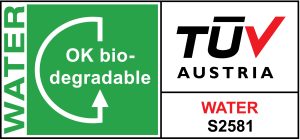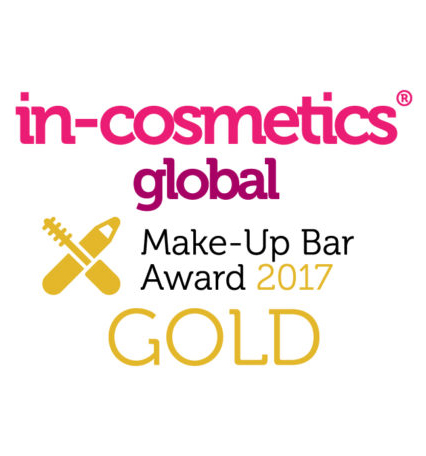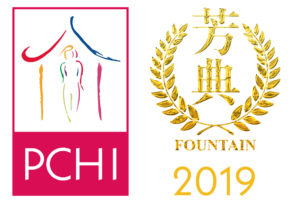CREDENTIALS
ECOLOGICAL CREDENTIALS
COSMETIC BIOGLITTER® SPARKLE RANGE
- Biodegradability: Independently tested by OWS Belgium to ISO14851 / ISO14852 fresh water biodegradability and proven to biodegrade highly in natural, fresh water environments.
- Very high fresh water biodegradability performance, official expressed as ‘biodegradability well progressed’. Only 3 percentage points away from meeting the incredibly high performance criteria required be awarded TÜV’s fresh water certification.
–
- Very high fresh water biodegradability performance, official expressed as ‘biodegradability well progressed’. Only 3 percentage points away from meeting the incredibly high performance criteria required be awarded TÜV’s fresh water certification.
- Ethically and Sustainably Sourced Raw Materials:
- Based on naturally derived raw materials that are ethically and sustainably sourced
- Special cellulose core derived from hardwoods, primarily eucalyptus, sustainably sourced from responsibly managed and certified plantations operating to PEFC™ www.pefc.org standards
COSMETIC BIOGLITTER® PURE & HOLO RANGES
- Biodegradability: Certified OK Biodegradable WATER by TÜV Austria (Logo/Cert Serial Number S2581)
- A level of certification considered the highest of its kind in the world

–
- Ethically and sustainably sourced raw materials:
- Based on naturally derived raw materials that are ethically and sustainably sourced
- Special cellulose core derived from hardwoods, primarily eucalyptus, sustainably sourced from responsibly managed and certified plantations operating to PEFC™ www.pefc.org standards
COSMETIC INDUSTRY AWARDS
COSMETIC BIOGLITTER® SPARKLE


- Green & Sustainable Winner
COSMETIC BIOGLITTER® PURE


- Green & Sustainable Winner
SAFETY CREDENTIALS
COSMETIC BIOGLITTER® SPARKLE & HOLO RANGES
Compliant with the following Cosmetic Regulations:
- US FDA (21 CFR)
- China’s Cosmetic Safety and Technical Standard (2015 version)
- EU Cosmetic Regulation (EC) No. 1223/2009 & (EU) No. 231/2012
- Japan – Ministry of Health, Labor and Welfare Ordinance No 126 of July 29, 2003. QD (JSQI)
- Australia – National Industrial Chemicals Notification and Assessment Act 1998 (NICNAS) and Cosmetic Standards 2007/ARTG
- Korean Cosmetic Products Act (KPCA)
- Canada – Cosmetic Regulations under Food and Drug Act
- ASEAN Cosmetic Directive (ACD).
COSMETIC BIOGLITTER® PURE RANGE
Compliant with the following Cosmetic Regulations:
- US FDA (21 CFR)
- FDA compliant for use on lip (aluminium free)
- China’s Cosmetic Safety and Technical Standard (2015 version)
- EU Cosmetic Regulation (EC) No. 1223/2009 & (EU) No. 231/2012
- Japan – Ministry of Health, Labor and Welfare Ordinance No 126 of July 29, 2003. QD (JSQI)
- Australia – National Industrial Chemicals Notification and Assessment Act 1998 (NICNAS) and Cosmetic Standards 2007/ARTG
- Korean Cosmetic Products Act (KPCA)
- Canada – Cosmetic Regulations under Food and Drug Act
- ASEAN Cosmetic Directive (ACD)
FDA REGULATIONS EXTRA COMMENT
-
-
- FDA regulations do not permit the use of aluminium on the lips.
- FDA regulations do not permit the use of many red D&C pigments around the eyes.
- FDA regulations do not permit the use of Iron Blue pigment on lips
-
Please consult specific product details for more information.
RULES ABOUT GLITTER SIZE AND USE AROUND THE EYES
To our knowledge there is no specific cosmetic regulation, however, the cosmetic industry applies a self-imposed limit of maximum 150mirons (maximum 006 glitter size) to cosmetic particles used around the eyes.
Therefore, according to this rule Bioglitter® sizes, 004 (100micron) and 006 (150micron) are suitable for use around eyes.
Bioglitter® is a precision cut product and all particles are the same size, unlike effect pigments such as micas or pearlescents which have a particle size distribution comprising of a mix of particle sizes.
ANTIMONY LEVELS
Cosmetic Bioglitter® contains low levels of heavy metals and is Antimony free (<0.5 ppm total content analysis, which is below detectable levels).
Cosmetic polyester glitter can have antimony levels as high as 150ppm and non-cosmetic polyester grades can have significantly higher levels. The antimony in polyester glitter is a by-product of a catalyst used in the manufacture of polyester and can negatively and adversely affect health.
